#Pyotr speculation
Explore tagged Tumblr posts
Text
Speculative philosophy arrives at the conclusion that the world undoubtedly exists, but that our conception of the world is false. This means that the causes of our sensations which lie outside ourselves really exist, but that our conception of these causes is false. Or, to put it in another way, it means that the world in itself, i.e. the world by itself, without our perception of it, exists, but we do not know it and can never reach it, because all that is accessible to our study, i.e. the whole world of phenomena or manifestations, is only our percept of the world. We are surrounded by the wall of our own percepts and are unable to look over this wall into the real world.
Pyotr Ouspensky, A New Model of the Universe
142 notes
·
View notes
Text
Who's in the portrait from Frozen - The Broadway musical?
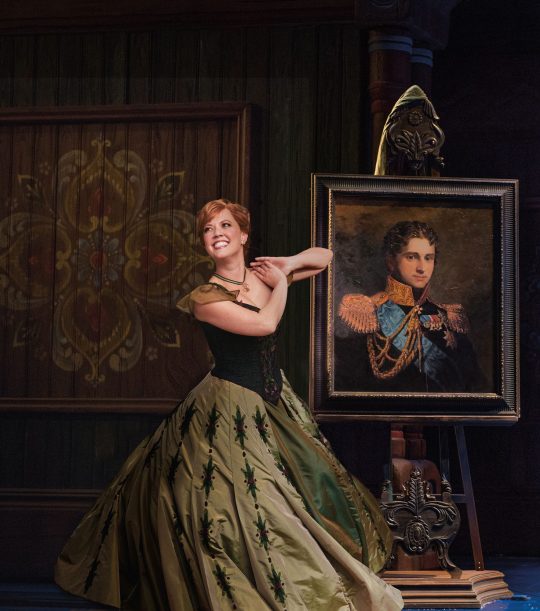
A quick recap: in the original Broadway production of Frozen, during "For the first time in forever", Anna is seen next to the portrait of some unknown gentleman. Who is he?
I initially thought (incorrectly) this was a portrait of a young King Karl XIV Johan who was the king of Sweden and Norway (where he was known as Karl III Johan) during the years 1818-1844, i.e. during the time Frozen takes place!

Portrait of crown prince Karl Johan by François Gérard 1811 (cropped).
It could have been a cool easter egg to have him appear in the musical but unfortunately (for me) it was not the case!
My friend @bigfrozenfan suggested (correctly) that the uniform of the man in the Frozen portrait was borrowed from a painting of the Russian prince and military commander Pyotr Mikhailovich Volkonsky (1776-1852):
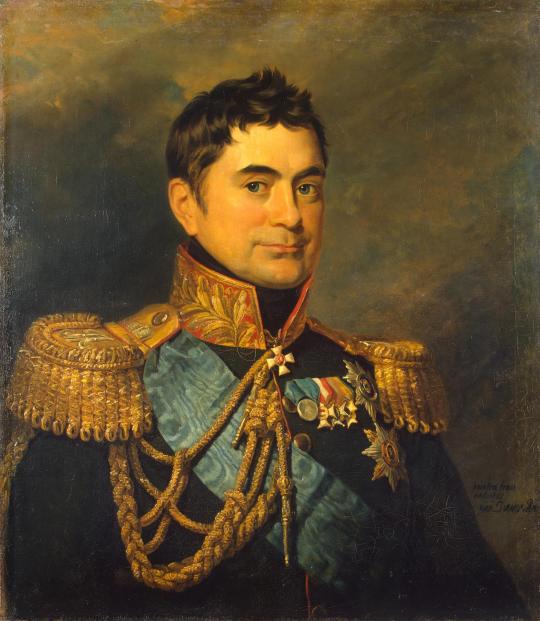
Portrait by English artist George Dawe circa 1823.
Unfortunately, this only gave us half the Broadway painting. We still needed the guy's face. Browsing image results on google, this painting of Russian politician and military commander Pavel Alexandrovich Stroganov (1774-1817) popped up, and it was a perfect match!
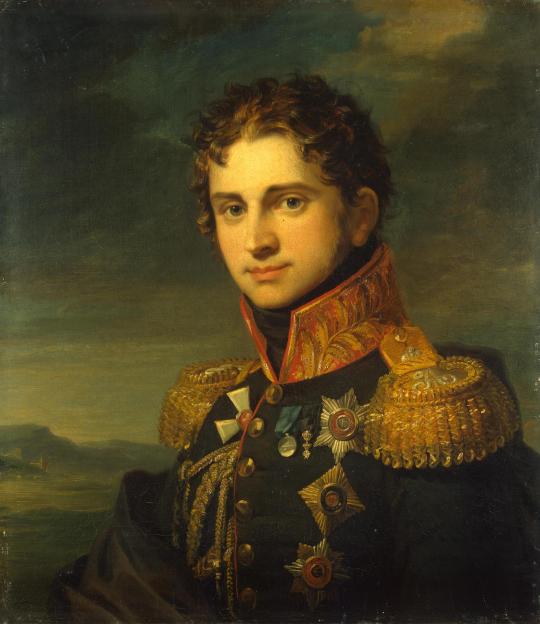
Portrait by George Dawe from some time before 1825.
Once we mirrored the picture...

Broadway on the left and original to the right.
Now, why Pavel decided to borrow his countryman Pyotr's uniform in the Frozenverse we can only speculate. What we do know is that they were both long dead when Frozen takes place.
Why were these portraits chosen by the set designers? Why not just use one portrait and call it a day? Why mane an edit? Probably just for fun. Maybe to confuse see if someone would figure out what it was based off of! 😄
It should also be mentioned that something strange is going on with the left epaulette. Compared to the original (right below), some elements of it has been copied and pasted in the Broadway version (left below). I have no idea why. maybe to save space in the picture. Other than that, the uniform appears to be completely unaltered.

I hope you learned something! 😁
Summary:

#frozen#frozen 2#disney frozen#frozen musical#frozen broadway#frozen concept art#frozen lore#frozen trivia#for the first time in forever#ftftif#arendelle archives
60 notes
·
View notes
Note
uh hello peppy I like your work a lot. I wanted to request if my OC could be made out into a fic I saw that in one of your post you mentioned and I was wondering if you could maybe write it (it’s fine if you don’t want to I was just wondering) her name is Lira she’s pale a tad bit introverted graceful I’ll send more to you in your DMs if you okay with that but
the idea I had was
Sir Andrew is philosopher in literature and teaches the youth but an older student one who appears no more than three years younger then him attends his classes. Everything about this student seems so intriguing their flawless skin the delicate voice it reminds him of a swan Sir Andrew logs down his fascination in this student of his and he notices his student has began to disappear more and more frequent, rumors around the village speculate that student is a witch or a cursed being and enchants men to drag them
I hope you can write this maybe thank you
Mint Jesus christ- damn this is long (that’s what she said) damn my child yall need to summarize this shit or send me your whole…essay of the Bible to me via DMs…
Hmmm this is interesting and based on the information you gave me…I can make this work
A Swan's Cry
Andrew Marston x Lira
Sir Andrew, a literature philosopher, becomes captivated by a mysterious student whose ethereal beauty and frequent disappearances fuel rumors of enchantment or a curse.
Sir Andrew was a man of reason, a philosopher well-versed in the works of the greats. As a literature professor, he had always taken comfort in the certainty of his books and the logic of his teachings. But the moment they walked into his classroom a student unlike any other that comfort began to unravel.
The student was quiet, almost ethereal in presence, with skin as pale as the winter moon and a voice so soft it reminded Andrew of a swan’s song both fragile and haunting. Their name? Lira, a name as delicate as the person it belonged to. Lira was no more than three years younger than Andrew himself, and yet there was something ancient in the way they carried themselves. They sat at the back of the class, always attentive, eyes gleaming like the surface of a still lake. But what fascinated Andrew most wasn’t just their beauty, nor their apparent intellect, but the way they seemed to vanish.
At first, it was subtle Lira missing the occasional lecture, leaving before classes ended, slipping away without notice. Andrew might not have cared, had the student not been so mesmerizing, so different from the rest. As the weeks passed, the absences grew more frequent, and rumors began to stir in the village.
“She’s not human,” whispered the baker’s wife one day as Andrew passed by. “Some say she’s a witch.”
“A cursed creature,” said another, eyes wide with superstition. “They say she enchants men, luring them to the lake where she drags them beneath the water.”
Andrew dismissed the gossip as village nonsense, but the more he saw of Lira and the more he didn’t see the more the words wormed their way into his thoughts. He began to write about Lira in his journals, not as a student, but as an enigma. He became obsessed with finding out more about them, piecing together the fragments of who they were. Where did they go during those long absences? Why did they leave so abruptly, as if carried by the wind itself?
Andrew finds himself intrigued by Lira more than any student he has ever had. He takes note of the way she walks, the grace in her movements, how she carries herself with the calm of someone who knows that the world bends to her will. Yet, it is not just her physical presence that draws him in; it is the mystery surrounding her.
He begins to log down his fascination in a private journal, as though trying to understand the enigma she presents.
March 10th, 1X—
"She arrived late again. Her eyes, a strange mix of indifference and sorrow, never seem to meet mine, but I can feel her presence in the room. She does not ask questions, nor does she answer much when spoken to. But when she does speak, her voice is so soft, it feels like it might vanish on the breeze. Today, she was absent for an entire week, and I wonder where she goes. What does she do when she is not in the classroom? The others notice her silence, but they do not understand what I see. She is... different. Like a bird that should not be caged."
One evening, while staying late at the university to finish grading papers, Andrew caught sight of Lira from his study. The student was walking towards the woods that bordered the village, their slender form fading into the fog that clung to the earth like a veil. On impulse, Andrew grabbed his coat and followed.
He kept a safe distance, his heart racing as he trailed Lira deeper into the woods, his logical mind battling with a creeping sense of dread. The further they went, the more the rumors replayed in his head cursed, enchanted, not of this world. It wasn’t long before they reached the lake, the surface of the water smooth and black beneath the moonlight. Andrew watched from behind a tree as Lira stepped to the shore, their hands trembling slightly as they stood at the water’s edge.
And then it happened.
With a graceful, almost unnatural motion, Lira began to shed their clothes. But it wasn’t the sight of their exposed skin that sent a chill down Andrew’s spine, it was the way their body began to change. Slowly, elegantly, as if woven by magic, their arms became wings, their body shrinking and reshaping. Before Andrew’s very eyes, Lira transformed, their human form giving way to that of a swan, the silver shoes that had adorn their feet in their original form, still embellished her feet even in the form of a Swan. A creature so pure and haunting it felt as though the world had fallen silent.
Andrew’s breath caught in his throat, his mind racing to make sense of what he had just seen. Lira the student he had been so captivated by was not just a person. They were the swan, the very creature from the old legends, a being cursed to live between two forms, one human, one bird. The rumors had been right, but not in the way he’d imagined.
For several moments, Andrew stood frozen, watching as the swan Lira spread its wings and drifted across the lake’s surface, a creature of both beauty and sorrow. His fascination deepened, but so did his dread. What was Lira’s fate? Were they truly cursed? And if so, who had done this to them, and why?
Days passed after that night, but Andrew could no longer look at Lira the same way. In class, they seemed more distant than ever, their eyes heavy with the weight of their secret. Andrew tried to approach them, but every time he got close, Lira would vanish, slipping away like a dream at dawn.
Eventually, the pull was too strong. Andrew sought them out, late at night, returning to the lake where he had first seen the transformation. There, he found Lira, once again standing at the water’s edge, their expression full of sorrow.
“Lira…” Andrew whispered, stepping forward. “I know what you are.”
Lira’s eyes met his, filled with a sadness that pierced his soul. “You shouldn’t have followed me.”
“I had to,” Andrew replied, his voice trembling. “Why? Why are you—”
“I am cursed,” Lira interrupted, their voice breaking. “Long ago, I angered someone powerful. Someone who could bend the rules of this world. They turned me into this… this creature, bound to the form of a swan by day, only able to walk in human skin at night.”
“Can it be undone?” Andrew asked, desperate.
Lira shook their head, their tears blending with the mist rising from the lake. “Not without a sacrifice.”
Andrew’s mind raced, torn between his growing feelings for Lira and the impossibility of their situation. “What kind of sacrifice?”
“A life for a life,” Lira whispered. “The one who loves me most must be willing to give up their own life to break the curse.”
Andrew stood silent, his heart heavy. He knew in that moment that he cared for Lira more than he had ever admitted to himself. But could he make that choice? Could he give up everything for the fleeting hope of saving them?
The days following Andrew’s encounter with Lira at the lake felt like a slow descent into an abyss. He couldn’t stop thinking about the curse, the impossible choice Lira was faced with, and the heart-wrenching sadness that lingered in their eyes. But there was no time to dwell on his feelings; the village, it seemed, was beginning to turn against them.
The whispers had started as mere rumors, harmless gossip passed from one person to the next, like the soft flutter of wind through leaves. But as time passed, the whispers grew louder. A chilling wind of suspicion began to stir through the streets of the village, and every passing day seemed to bring new voices to the chorus of doubt.
“She’s a witch,” they said. “A cursed creature.”
“They say she makes men disappear, drags them under the water,” someone would add, their voice quivering with fear. “She’s not human.”
Andrew had heard these rumors. He had seen the fearful looks from townsfolk as they avoided Lira in the streets, the sharp whispers that followed her every step. But it wasn’t until one fateful afternoon that he realized just how deep the hatred had sunk into the hearts of the villagers.
Andrew had been walking to the local market when he saw them. A group of villagers, led by the blacksmith’s son, marched toward the woods. There was fire in their eyes, a righteous fury that made Andrew’s stomach turn.
“What are you doing?” he asked, his voice low, trying to keep his presence unnoticed.
“They’re going after her,” the blacksmith’s son, a burly man named Roderick, said with an eager sneer. “We’ve had enough of her. The witch needs to be dealt with.”
“What do you mean, ‘dealt with’?” Andrew demanded, his voice shaking with disbelief.
Roderick glanced at him with narrowed eyes. “You don’t really believe in that nonsense, do you? She’s not just some strange girl who’s a little different. She’s dangerous. The things she’s done, the way she makes people disappear…” His tone became more sinister. “She needs to be stopped before she harms anyone else.”
Andrew’s heart pounded in his chest. He wanted to shout, to stop them, to reveal everything he knew about Lira, to defend her from this growing tide of hatred. But the words caught in his throat, weighed down by the knowledge that he was too late. The villagers had already made up their minds. They had already condemned her.
“No,” Andrew said, his voice fierce, but it faltered under the pressure. “You can’t. She’s not what you think.”
“Enough of your nonsense, Andrew,” Roderick barked, shoving him aside. “Stay out of this. It’s for the good of the village.”
As they disappeared into the trees, Andrew felt a cold emptiness settle in his chest. He couldn’t stop them. He couldn’t change their minds. And worse still, he had no idea where Lira had gone. Had she heard them? Did she know what was coming?
That night, as the moon rose high over the lake, Andrew found himself standing at the water’s edge once more. His thoughts were a chaotic whirl of fear, guilt, and desperation. He needed to warn her. He needed to protect her.
But as he stepped into the woods, he heard the sound of voices angry, yelling voices growing louder. He hurried toward the source, his heart pounding in his chest.
He found them at the lake, the villagers gathered around the water’s edge, torches in hand. The blacksmith’s son stood at the front, a cruel smile stretched across his face.
“There she is!” Roderick shouted, pointing toward the water. “The witch!”
Andrew’s stomach churned as he caught sight of Lira, standing at the water’s edge, her face pale and full of sorrow. She had heard them. She knew they were here.
“Lira!” Andrew shouted, rushing forward, but the crowd blocked his path.
“She’s no witch, you fools!” he cried, his voice breaking. “She’s not dangerous. You don’t understand she’s cursed!”
But the villagers were deaf to his words. They had already made their decision. The fear, the superstition, the years of whispered rumors had all led to this. They were convinced that Lira was the source of their misfortune, that she was the one who had caused the disappearances, the strange deaths, the accidents.
Lira stepped back from the water, her eyes meeting Andrew’s. She didn’t seem afraid. No, she was resigned, as though she had been waiting for this moment all along.
“They don’t understand,” she whispered, her voice barely audible over the sounds of the crowd. “They never will.”
Roderick raised his torch high, his eyes alight with malicious excitement. “Burn her! If she won’t burn, she’ll drown.”
Andrew’s heart stopped. The mob was pushing forward, closing in around her. Lira stood still, her body trembling, her arms outstretched as though she were ready to surrender to whatever fate awaited her.
“No!” Andrew shouted, throwing himself into the crowd, but they shoved him aside with ease, too many hands to fight against.
Lira’s form flickered. Slowly, almost painfully, she began to transform before their eyes. Her limbs shifted, her skin turning pale and fragile as the feathers of her wings began to unfurl. In a single, fluid motion, she became the swan, a beautiful creature of grace and sorrow.
But even as she took flight, the villagers didn’t relent. They threw their torches into the air, aiming to strike her down, their voices rising in a collective frenzy. They believed her to be a monster, a threat to their safety and their way of life.
Andrew collapsed to his knees, his heart breaking. He had failed her. In his attempt to protect her, he had only pushed her further into danger. She had vanished into the night sky, but the hate of the villagers remained, and it was spreading.
The sound of the swan’s cry echoed across the lake, a haunting, mournful wail that seemed to carry all of the pain and sorrow of Lira’s curse. And Andrew, standing alone in the dark, could do nothing but listen.
The night after the villagers had attacked, the air in the town was thick with whispers, as though the very walls of the buildings held secrets that nobody dared speak aloud. The moon hung high in the sky, pale and heavy with the weight of the events that had transpired. Andrew could barely bring himself to leave the safety of his home. He couldn’t sleep, couldn’t eat, couldn’t shake the image of Lira her wings, her cry fading into the night sky.
The whole village had erupted into chaos, their superstition and fear culminating in the most senseless of hunts. Lira was no longer the mysterious, enchanting student he had once admired from afar. She had become something darker in the eyes of the villagers, something dangerous, something that had to be destroyed. The whispers had escalated into the open, and what had once been quiet judgment had now grown into an unrelenting demand for blood.
Andrew could feel it all, every ounce of that pressure, pressing down on him. Lira wasn’t just a mystery anymore; she was a symbol, an embodiment of everything the townspeople feared. And it was all because they couldn’t see her for who she truly was.
But what they hadn’t seen, what no one had known except Andrew, was that Lira wasn’t like the others. She wasn’t some dark magic conjured by ancient forces. She wasn’t evil, or cursed by wicked intentions. No, Lira was a creature of nature delicate and beautiful, but powerful beyond measure. And as he stood at the lake the following evening, staring out across the glassy surface, he realized just how much he had failed her.
The town had chased her away, maybe even driven her into hiding. But she would never be gone from his heart. He would find her. He had to.
Andrew knew the moment he saw her.
She appeared at the water’s edge, a silvery figure gliding across the surface, her feet barely making a ripple. The moonlight caught her feathers, illuminating her in a halo of light. For a moment, Andrew thought he might be seeing things perhaps his mind had begun to play tricks on him in the wake of the chaos. But no, it was her. Lira. Or the swan that had been her all along.
She moved with the grace of someone born to this world, as though the water had always been her home. Every step she took across the lake was fluid, effortless, as if she were walking through air itself. The water didn’t break beneath her; it parted gently as she moved, as though it were welcoming her.
Andrew’s breath caught in his throat as he stepped closer, his feet soft on the wet earth. She was so close now, within arm’s reach, but she didn’t notice him yet. Her eyes were focused ahead, her expression both sad and serene.
"Lira," Andrew whispered, his voice hoarse, trembling with emotion.
Her eyes flickered, her steps slowing until she finally turned to face him. The moment their gazes locked, a deep sorrow passed between them, and for a brief, impossible moment, Andrew thought she might speak. But no words came. Instead, she tilted her head as if weighing him in her mind.
“Lira,” Andrew said again, a soft plea in his voice. "You don't have to hide from them. They don’t understand. You don’t have to do this alone. Please"
But before he could finish, she stepped back, her feet barely brushing the water’s surface. Her wings were so magnificent, so wild flared outward, catching the breeze. They were sharp and pure, like something from a dream. Her delicate, haunting beauty was both ethereal and unreachable. She was a creature of the water, and she was beyond the world Andrew lived in.
“I don’t belong here,” she said, her voice a soft murmur, carried by the wind. The words seemed to come from some place deep within her, like a secret only the water knew. “They’ll never understand. They’ll never accept me. Not for what I am.”
Andrew stepped forward, desperate. “Don’t say that. You’re more than what they think. Lira, please, don’t go.”
But as he took another step, something in her eyes shifted, something that told him she was already slipping away.
“I can’t stay in a place that fears me,” she said, her tone distant, almost resigned. She turned her back to him, her bare feet gliding across the water once more. She didn’t walk on the surface as she had beforeno, she danced, the water flowing in perfect rhythm with her every move. She was part of the world now, part of the night, part of something too beautiful for the village to understand.
“You can’t change them, Andrew,” she continued, her voice growing faint. “You’ve tried. But I’m not meant to stay. I’m meant for something else... somewhere else.”
Andrew felt the bitter sting of realization settle in his chest. He was losing her. In trying to protect her, he had only driven her further away. He had failed, and now he was standing in the remnants of what could have beena love that could never survive in a world so full of hatred.
“No, Lira. Please, don’t go,” he begged, taking a step forward, his voice cracking with raw emotion.
She paused mid-step, her body almost floating above the water as she turned to face him one final time. Her eyes glistened with the weight of a thousand unspoken thoughts. And in that moment, Andrew saw the truth the truth he had tried so desperately to ignore.
Lira wasn’t just a student to him. She wasn’t just the girl who captivated him with her delicate beauty, her unearthly presence. She was a part of something greater, something untouchable. And no matter how much he wanted to fight for her, no matter how much he loved her, he knew there was no place for them in this world.
“I’m sorry,” she whispered, and with a flick of her wings, she soared into the night, disappearing into the vastness of the lake, leaving nothing but ripples in her wake.
Andrew stood there, alone at the water’s edge, his chest heavy with the unbearable weight of her absence. The villagers had driven her away, their fear and hatred had forced her to retreat, to become something even more unreachable. He couldn’t protect her. No one could. And now, all he had left was the memory of her swan’s crythe haunting song that would forever echo in his heart, no matter how far she flew….
-Fin
Hey…hey yah you 🫵🏾 do you want more Sakuverse gay shit well hit that follow button or turn on notifications and send a request and you can get all the gay shit you ever want and brand new fics of Sakuverse Reimagined Twist Of Fate and maybe a chance to have your OC in a story
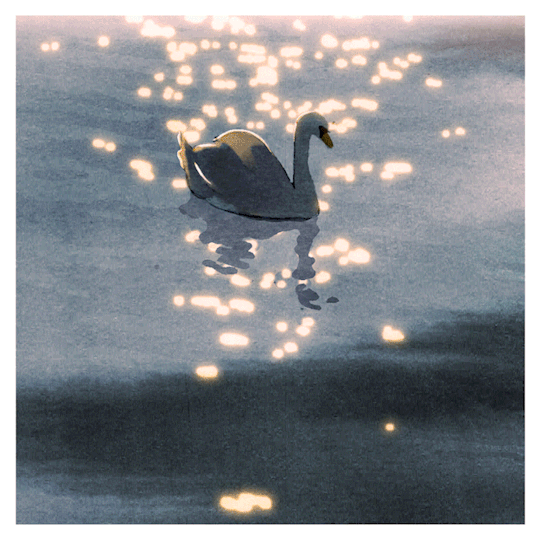
#sakuverse#zsakuva#peppymintdreamsproduction#andrew#andrew zsakuva#zsakuva andrew#andrew marston#sexy professor#self insert#oc#x oc#ask the mint and you shall receive#ask and you shall receive my dream child#author mint#writer mint#swan#andrew x listener#Lira#boyfriend audios#audio#zsakuva fandom#fan fiction
1 note
·
View note
Text
New Muse: Nikto (Heavily Headcanon Based)


Moniker: Nikto
Real Name: Pyotr Petrov
Bio: Drafted into the Russian Army at 17 in 2011, brought into the FSB in 2016 as a Deep Cover Agent to infiltrate an Ultranationalist Group being lead by Mr. Z later discovered to be Viktor Zakahev, the son of Imran Zakahev, associate to Perseus. Pyotr was captured, tortured, his face was disfigured and in that moment of major stress was the first crack in his psyche. What happened afterwards was up to speculation but by the time anyone in the FSB caught wind and word nobody remained living and all that remained was Pyotr covered in blood muttering to himself the word 'Nikto'. His handler at the time, Kamarov witnessed this and when trying to get Petrov's attention he seemed to snap back to his old self, all be it, a more damaged look in his eye as opposed to the killer, Nikto.
Much to the chagrin of Kamarov though, Petrov soon after reinstated and brought into Spetsnaz to hunt for Chemical Weapons in Urzikstan but was caught in a firefight with Warcom Forces lead by Mara. The situation dire, Kamarov tells Nikto to do whatever it took and the twitch in his eye signaled a change back to Nikto and shortly after that Nikto stayed at the helm during the partnership with Armistice.
The partnership didn't seem to last long when Armistice soldiers began to turn on one another, leaving Nikto alone in the war-torn city. He had to fight to survive constantly and kill, and any allies he did come across he kept a scrutinizing eye on.
When Zakhaev was said to be KIA, a Ghost Ship called the Vodianoy seemed to miraculously appear off the coast of Verdansk just a few feet away from the Gulag there. When the zombies afflicted by an unknown virus thought to be from the Chemical Weapons onboard stormed the Gulag and infected the prisoners and the guards there, Nikto's job with what members of Armistice he could trust given the massive Blue on Blue Incident that transpired at Verdansk International Airport, his job switched to containment, but even so the stress started to eat at him even more leading him to become a little more feral as the monsters that actually ate people were growing in massive numbers. When word got around that a Nuke was gonna be dropped, Nikto and whoever he was with made it a priority to get the hell out of dodge. That was the last recorded battle from Nikto before he went AWOL in 2022.
Fast Forward to 2023: Nikto is spotted with 'Peacekeepers' later discovered to be Konni PMCs under the Command of Makarov. Its unclear if Nikto is still friend or foe.

12 notes
·
View notes
Text
This Day in X-Project - June 10
2015: Jubilee emails Kurt wanting to spend time together. Kitty and Cecilia meet and talk about the weirdness of a second stay at Xavier's. Roxy and Xavin hang out at school and talk about summer cheerleading camp and underground battle league. Roxy posts to the Generation X comm about battle league.
2016: Laurie reflects on soap operas. Alison speculates on an adage. Sooraya announces she's becoming an American citizen and asks Angelo and Angel to join her at her naturalization ceremony. Miles asks the Gen X-kids about the ACT and a local party.
2017: Sooraya and Jean make plans for a future research project.
2018: Darcy rewards herself with a massage for finishing her first year back at school before inviting people to watch the Tony Awards with her.
2019: Kitty finds a creepy object and offers it out as a birthday gift. Molly lets everyone know that she’s decided to dye her hair brown. Clea’s looking to attend this year’s NY Comic Con and makes a post asking if anyone wants to go with her. Fear in the Dark: Tandy provides Cul with an update about what’s happened so far.
2020:
2021: Topaz finds a disoriented Jean, following a long shift at the hospital for the latter.
2022: Terry messages Angelo and Sooraya about her trip back to Ireland. Pyotr and April do some puppy training.
2023:
0 notes
Text
Speculation about Pyotr.
Sooo. Semaphores. Those military flags they use to communicate across boats and stuff, largely before radios.
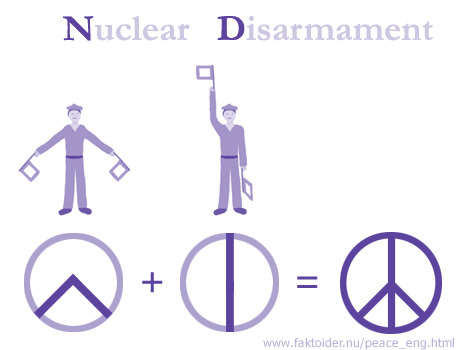
Did you think this symbol meant, ‘peace’? No. It meant, ‘Nuclear Disarmament.’ All along. It was the cold war mentality against nuclear bombs, as well as, nuclear power. Civilian or government run. They conflated Nuclear Disarmament to mean peace, and so it became a peace symbol.
I’m still old enough to remember stateside, the people that were 15-20 years older than I was in the 80s. People that lived through the 60s and 70s. I’m 38, so they’d be in or nearing their 60s by now.
But if you find a person that today would be called an SJW, you found a person that probably had a negative opinion about, at least, the capitalist west using nuclear power- because they deliberately would conflate nuclear weapons with nuclear power. And I remember hearing many the passioned rant about how one could not exist without the threat of weaponization of the other.
So why do I bring it up in the context of Hunter: the Parenting?
Look at Pyotr’s shirt.
It’s like when metal and goth musician aesthetic wear upside down crosses. But I don’t 100% understand what this means. Is he against nuclear disarmament? I don’t know. It’s the “peace” symbol, upside down and red. Either he’s pro-nuclear (civilian nuclear power, weapons) or pro war, and I don’t know which is intended. That may be intentional.
Well. Pyotr was embraced/died in 1985. He can’t be over 40- I’d wager he’s not even over 35. Pyotr strikes me as a vampire born in the 1950s, grew up and matured in the 60s, went through his 20s in the 70s and was 35 by 1985. Just passed the two decades of conscientous objectors, the Viet Nam war and the hippie movement.
He sounds like an American to me, but I’ve been deceived by how well Scandinavians and East Europeans can speak English before. Like, props, because some of yall consume western media like crack and I could confuse your accents for midwesterners at times- which is supposed to be the flattest, most basic kind of American English. Not drawling like the Deep Souf, not twangy like other parts of the south, not sounding like a Californian or New Englander. Just.. that sure is some American English, there.
So Pyotr could verywell be someone that learned English. Given the era it wasn’t especially common to find an American named Pyotr during the Cold War. There’s a tradition of immigrants coming here and naming their kids more anglicanized versions of the names. So, Pyotr becomes Peter.
So the big question is whether he was a native of Europe or one of its former colonies. Was Pyotr his real name, or did he name himself that?
We know by his long, greasy hair that he couldn’t have been military- at least, not at the time he died and was embraced. His shirt doesn’t seem very Hippie-like. An underwater welder with really long hair? I guess it’s possible that his employers could’ve allowed it because they just intended to kill him anyway.
Pyotr died under the water, embraced by a Nosferatu, presumably beneath the sea. Or perhaps a lake. Some body of water, somewhere. Possibly even in a sewer or sewage system? By his own superior- which raises even more questions.
What was Pyotr working on, beneath the waters? Was it related to nuclear power? Was it an above-the-board job, or a secret organization that he was employed for, being paid on the sly? We don’t know.
Initially I thought that going by the vulgar names of Shitbeard and Ape Boy, Pyotr might have decided to call himself the Russian name for, ‘faggot.’ But, after reaching out to the local Russophone I know, I can safely conclude, no, Pyotr PROBABLY did not name himself the English phoenetic of the Russian way to say and spell(anglicized) Peter. I was wrong in assuming he was over pronouncing it to muddle it between, ‘Peter’, and, ‘faggot,’ but the Russian word for faggot does sound more like the way Peter is said in English. So, this would’ve meant he either didn’t know how to properly pronounce it as a Russian would, or overpronounced it to distance himself from the term. Piotr = yes, P-Yo-Tur = no.
So then I started wondering if perhaps Pyotr might be a Russophile during the Cold War. Supposing Pyotr was English/British and not American, this might mean Pyotr was a Western Sympathizer for Socialism, Communism and the Soviet Union. One of those people in England that sided with the USSR and saw them as morally/ideologically right, no matter what they had to excuse them doing.
Also known as, a tankie.
So I’m going to guess his name is definitely not wordplay/vulgar or problematically sneaking in calling himself a faggot. Just.. if anything an anglophone with possible Russophile leanings.
Assuming Pyotr was possibly some sort of conspirator or terrorist in life, being a long haired counter-culture underwater welder, he could’ve conspired to do something constructive for some not-so-good guys. Which, wouldn’tyaknowit, would bring him smack dab into his sire’s web.
We don’t know for sure if Pyotr was embraced by a Camarillan Nosferatu or Sabbat. Were I to hazard a guess, I’d say Sabbat, but Nosferatu delve between both equally. He could just as easily have been honeypotted by a patriotic Nosferatu guarding the region wherever Pyotr and presumably his other welders got ate and turned, as he could’ve been just extorted for illegal, questionable labor underwater and then disposed of to not have to pay them.
Perhaps I’m just following trails that are not there, seeing shadows and leads that don’t exist.
Or, something very terrible is in motion and may involve nukes under the sea, in Hunter: the Parenting.
#Hunter: the Parenting#Pyotr speculation#vampire: the masquerade#theory#spoilers#longpost#long#long post
39 notes
·
View notes
Photo
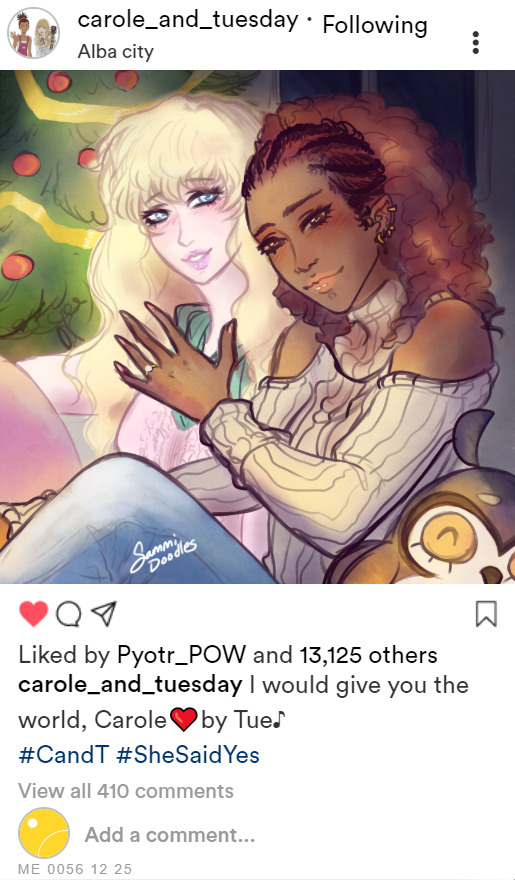
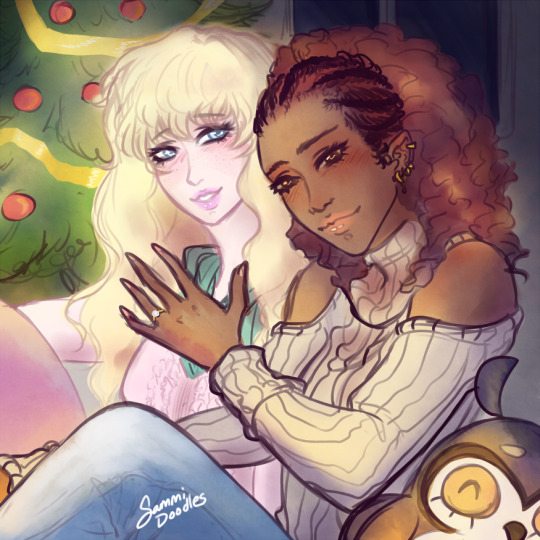
To be continued...in your mind...six years later... c:
#carole and tuesday#キャロル&チューズデイ#anime#WLW#yuri#Fanart#carole#tuesday#i thought itd be cute to make it look like an IG post#i need this future AU#tuesday proposes to carole on her birthday at midnight on the dot#merry xmas future wife finally#insta is on fire for days after their post#roddy was crying when he took the pic#gus cries at the bar and brags he knew it all along#angela likes the post casually#but you can bet angela doesnt stop anxiously pacing until CandT text her back thank you#then she yells at them for not inviting her over to party sooner#pyotr makes a huge deal about it and speculates how soon is the wedding#ertegun makes a flashy congratulatory concert and announces he is gonna dj the wedding#candt havent asked him yet but at this point they cant say no#spencer offers to help plan the wedding#valerie offers to pay for it#they pick a date#its set for april#april tenth
160 notes
·
View notes
Text
Most heartwarming things about every composer ❤️
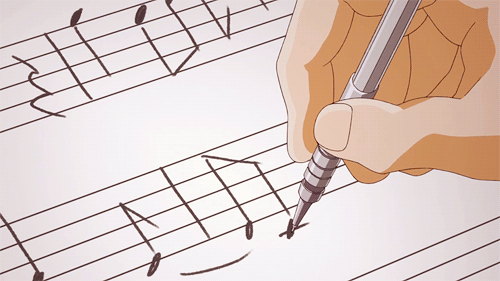
┏━•❃°•°❀°•°❃•━┓
Mendelssohn: the profound respect he had for others
The way he’s so cordial with strangers and even the people he dislikes
Man always remembers his manners and acts cordial as his family has taught him
And on occasions, his bursts of excitement to the point of switching languages highlights his joy to see who his loves
From the 1830's when he was in his 20s: “his excitement was increased so fearfully … that when the family was assembled … he began to talk incoherently in English.”
“His attachment to Mademoiselle Lind’s genius as a singer was unbounded, as was his desire for her success.” About Mendelssohn’s attitude to his wife
The amount of passion letters he wrote may be destroyed, but how his wife described him spoke it all: “He was the only person who brought fulfilment to my spirit, and almost as soon as I found him I lost him again.” ๐·°(৹˃̵﹏˂̵৹)°·๐ the feels bro
Recommended piece: Op. 34 No. 2
⊱ ────── {⋅. ♪ .⋅} ────── ⊰
Chopin: his love for family
Despite his disrespect and uncalled for criticism towards other composers, he still cares about his homeland
Even in his deathbed, he asked a soprano to sing the Polish national anthem
And he sent his siblings letters everyday when he was out of town
And through his ‘love’ letters to his friend, Tytus, you can tell he was passionate (;
“You don’t like being kissed. Please allow me to do so today. You have to pay for the dirty dream I had about you last night.” 👀 Chopin to Tytus — his ‘best friend’
We might never know if he actually meant it or if it was social etiquette back then, but the speculation is still there
Recommended pieces: Op. 22
⊱ ────── {⋅. ♪ .⋅} ────── ⊰
Liszt: everything about him
this man truly was an underrated jewel in the classical word
He was generous to the point where he went broke from teaching music free of charge and holding charity concerts all the time
People from his and our time both misunderstand him for being a womaniser, but he was more than that
He never disrespected any female composers and even when he criticised by his contemporaries, he always kept his cool and even complimented some of them
When Chopin criticised him for playing his nocturnes the wrong anr demanded an apology, Liszt still continued to admire him
Composer chivalry fr.
Recommended pieces: Totentanz
⊱ ────── {⋅. ♪ .⋅} ────── ⊰
Tchaikovsky: his devotion and mellow kindness
He was sweet and shy. Unlike Chopin.
Having only a few close friends and a tightly-knit family, he was fiercely loyal and to whom he loved.
As a gay man in the conservative 19th century Russia, he could only seek solace with his closest friends — his sister being the closest.
When his sister passed, all he could was to dedicate the entire Nutcracker Ballet to her as a part of his self-expression died with her.
And she meant a lot to him. Not only a part of himself was buried, the fact he loved her so much despite his depression and dissatisfaction towards his life, showed how close he was to his family.
Recommended piece: Pas de Deux (it showed his lonely yearning for love in my interpretation; those whimsical melodies and how he missed both sisterly and romantic love)
⊱ ────── {⋅. ♪ .⋅} ────── ⊰
Beethoven: man pulled 2015 pranks in the 19th century
Even though he scowled and raged throughout his life, he pulled pranks and laughed when his guests fell for it
He hid behind the door and scared his guests whenever they went through it
Laughing at their annoyed faces, he continued to turn annoyance to offence when he made his friends the butt of his jokes
To further gouge tears from his grumpy little face, he made more short songs solely as jokes about them
Besides being a hopeless romantic who made Fur Elise as a way to diss Elise, he wrote lyrics, “we all agree that you are the biggest ass” when joking about his violinist friend
Beethoven was either a great or absolutely horrible friend to have
⊱ ────── {⋅. ♪ .⋅} ────── ⊰
Shostakovich: a genuinely good guy
Every lonely person’s wet dream
Showing up on time, being nice back to everyone who was nice to him alongside living life the normal way despite being a composer, he never raised any aggression tendencies like other composers (take notes Beethoven :/)
Love extended beyond family and friends. He threaded and worded his letters with kindness and manners, especially to those who asked him for advice
Even under his intense stress and anxiety during the Soviet Union’s surveillance, the man loved his family.
And that in itself was impressive.
┗━•❃°•°❀°•°❃•━┛
Author’s note: I may not have written a recommended piece for all of them because I am not well-versed in most of their pieces yet
Do tell me what composers to do. I am happy to write about them <:
Much feedback is appreciated ଘ(੭*ˊᵕˋ)੭* ੈ♡‧₊˚
#classical music#chopin#creative writing#liszt#classical music memes#tchaikovsky#pyotr ilyich tchaikovsky#mendelssohn#felix mendelssohn#franz liszt#frederic chopin#fryderyk chopin#beethoven#ludwig van beethoven#shostakovich#dmitri shostakovich#Spotify
639 notes
·
View notes
Text
Anonymous asked: What’s your favourite piece of classical music that you discovered through a film soundtrack?
What an interesting question to which I have had to really scratch my head and think a little. The main issue is that if you are, like me, one of those kids who was exposed to classical music and some of its canon from an early age then the question becomes harder to answer. Like many other children, I was taught to play musical instruments and have music lessons from about 6 years old onwards. Films, especially the more adult themed ones with a classical score, were something you discovered much later in your teens onwards. So I’m going to cheat a bit here and there. For example I can’t include Milos Forman’s classic movie ‘Amadeus’ because I was already familiar with a range of Mozart’s repertoire before watching it.
Predictably, I’m going have to start with Walt Disney’s classic film ‘Fantasia’ (1940). This was perhaps the first film I was truly exposed to classical music in all its glory. It was Disney’s love letter to classical music and I can still watch it with child-like wonder at the magnificent music set to an incredible animation.
I’m pretty sure that Igor Stravinsky almost certainly wasn't thinking of dinosaurs when he wrote his ballet The Rite of Spring. But Walt Disney and his talented team of animators decided to tell the story of these prehistoric creatures using the dramatic, angular sounds of Stravinsky's masterpiece. And it's become one of the most famous sequences of the 1940s film.
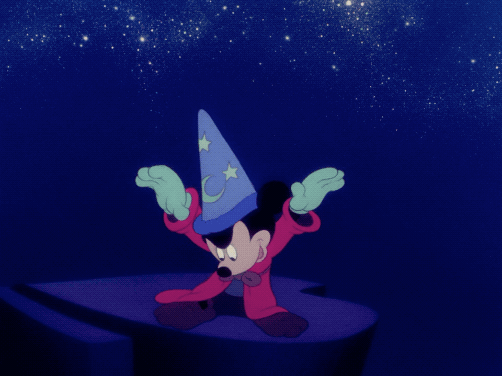
The score was performed by the Philadelphia Orchestra under Leopold Stokowski and was narrated by composer Deems Taylor was awesome. As magnificent was the music that Toccata and Fugue in D minor by J. S. Bach, selections from The Nutcracker Suite by Pyotr Ilyich Tchaikowsky, The Sorcerer’s Apprentice by Paul Dukas, Pastoral Symphony (Symphony No. 6) by Ludwig van Beethoven, and the “Dance of the Hours” by Amilcare Ponchielli, it was the last two pieces that left a real impression. Of course I’m talking about Night On Bald Mountain by Modest Moussorgsky, coupled with ‘Ave Maria’ by Franz Schubert.

I’m also going to add Léo Delibes’ Flower Duet (from the opera Lakmé). I used to hear this ad nauseam but not in a movie. This classic piece was the chosen soundtrack for the British Airways advertisement on television and in their departure lounges and flights. The ad - updated often - has been around in one form or another but with the same soundtrack since the 1980s. It was a huge feature of my childhood in the 90s. Whenever I boarded a flight in the Far East or South Asia or the Middle East to fly back home to Britain - because we lived overseas - you would hear this as you strapped yourself in to your seats.
As for my main list (in no particular order):
youtube
Second movement of Beethoven's Symphony No.7 from: The King’s Speech (2010)
The climactic scene where King George VI has to make his speech ‘unto the nations’ was made more powerful by this piece. Like King George VI and his personal battles with his voice, much speculation has taken place over what personal agony the musical piece reflects in Beethoven’s life, especially since sketches for the movement predate the symphony by several years.
One clue is that Beethoven, who conducted the premier in December of 1813 for the veterans of the Battle of Hanau, made an address to these veterans, saying: "We are moved by nothing but pure patriotism and the joyful sacrifice of our powers for those who have sacrificed so much for us." There is every reason to believe that the deep emotion of this movement was founded on anything but what he said it was. His sentiment had existed long before 1813, as had the wars. Napoleon was being repelled, and the symphony is overall joyous.
However, Beethoven was not the kind of man to casually dismiss sacrifice, and the concert was dedicated to veterans. I believe that this movement celebrates those military veterans who made sacrifices for their nation, in much the same way King George VI was asking his subjects in Britain and the Commonwealth in the fight against evil menace of Nazism and Fascism.
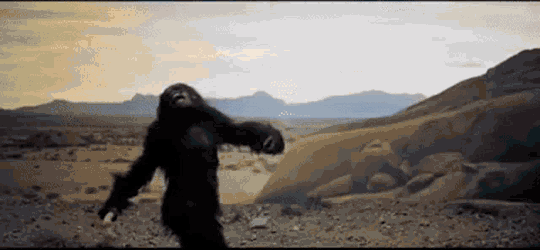
Ligeti's Lux Aeterna and Requiem from: 2001: A Space Odyssey (1968)
I hated it. I saw it as a teen and I thought something was wrong with the audio. I still hate the piece but at least I know who Ligeti is. It was way too avant garde for me back then and it remains so today. I think scratching your nails down a chalk board has more melody than a piece by Ligeti. Kubrick clearly loved his work and used it in his other films such as The Shining and Eyes Wide Shut.
Richard Strauss - Also Sprach Zarathustra from 2001: Space Odyssey (1968)
By contrast I loved it. Music can be the difference between a highly memorable scene and one that leaves viewers with an indifferent shrug. It’s hard to believe that this classical piece was used in the main opening scene of the film originally as a temporary place holder by Kubrick whilst he waited for the film composer, Alex North, from the full soundtrack. In the end Kubrick left Strauss in and it made all the difference.
youtube
Franz Schubert’s Piano Trio in E-Flat from: Barry Lyndon (1975)
The Piano Trio No. 2 in E-flat major for piano, violin, and cello, D. 929, was one of the last compositions completed by Franz Schubert in 1827 and one of the last pieces he heard being performed before he died. The track itself has been used in countless of movies over the decades such as The Hunger, Crimson Tide, The Piano Teacher, L'Homme de sa vie, Land of the Blind, Recollections of the Yellow House, The Way He Looks, The Mechanic, Miss Julie, The Congress, and the HBO miniseries John Adams. But I first heard it on Kubrick’s film Barry Lyndon and remember being captivated by the film and the music. I was a teen watching it my parents and the whole scene at the card table was beautifully directed and wonderfully lit. As I learned much later in life, Kubrick and his team invented new kind of film lens to be able to film in candlelight.
Handel's sarabande from: Barry Lyndon (1975)
The sarabande is traditionally the music written for a courtly dance in triple metre. Handel's version was composed for solo harpsichord at some point between 1703 and 1706 and first published in 1733. This classic piece is the 4th movement of the Cette pièce est le quatrième mouvement de la Suite in G minor composed for the harpsichord. Although the Sarabande was originally intended by its composer to be played solo on harpsichord, the orchestral version of the Sarabande is very well known these days thanks to the Barry Lyndon film. Moreover, the Sarabande is beloved by filmmakers and has been adapted several times for various films. It’s one of my favourite pieces and it reminds me of the English countryside for some reason rather than some formal court dance.
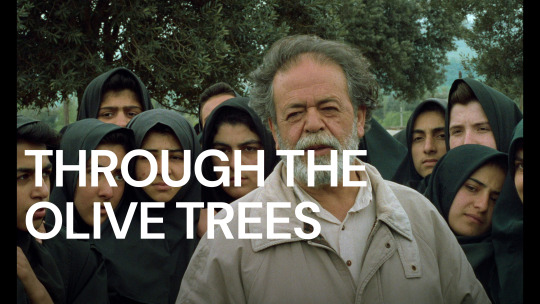
Domenico Cimarosa’s Concerto for Oboe in C Moll from: Though the Olive Trees (1994)
Directed by Abbas Kiarostami, this little known Iranian-French film was something I stumbled upon through my Norwegian mother who loved these kind of independent films when we lived in South Asia as an antidote to all the Bollywood films we children enjoyed. Kiarostami’s film traces the trouble arising when the romantic misfortune of one of the actors on a film set - a young man who pines for the woman cast as his wife, even though, in real life, she will have nothing to do with him - leaves the director caught in the middle. In hindsight I can now say it was a metafictional masterpiece. Kiarostami contemplates cinema and its romantic fallacies. The film is gorgeously grounded in Northern Iran’s folk traditions and with a soft focus on its shaken yet convalescent landscape. It’s a warmhearted tale that explores what happens when love goes unrequited - which was surprisingly relevant to a teen with raging hormones at the time.
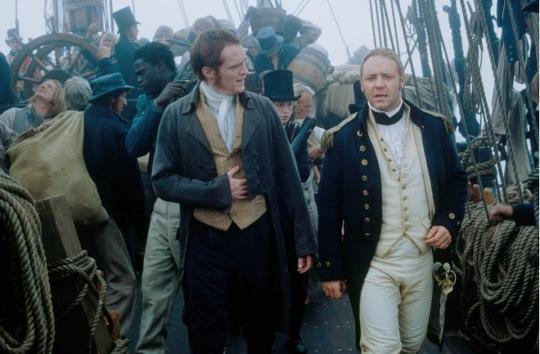
Ralph Vaughan Williams’ Fantasia on a Theme by Thomas Tallis from: Master and Commander: The Far Side of the World (2003)
A classical musical masterpiece in a masterful cinematic movie - both epic in every sense of the word. As a former British Army combat pilot it’s the only film that made me have a smidgen of sympathy with the Royal Navy. It was one of the first films I was allowed to go and see at the cinema itself as a teen. The film is almost faultless in terms of acting, directing, cinematography, and authentic detail. It even made me go and read one or two of the books by Patrick O’Brian. How Peter Weir never won an Oscar for directing I shall never know.
Vaughan Williams’s Fantasia on a Theme by Thomas Tallis is a 15-minute (or so) work for double string orchestra and string quartet, based on a melody by the 16th century composer Thomas Tallis. The quartet traditionally sits away from the orchestra in performance, to create an atmospheric antiphonal (alternating voices) effect. It is often known simply as the ‘Tallis Fantasia’. The tune is from a setting of Psalm 2 that Tallis wrote in 1567. It originally sets the words ‘Why fumeth in sight: The Gentils spite, In fury raging stout? Why taketh in hond: the people fond, Vayne things to bring about?’ It was in 1910 at a festival that Vaughan Williams himself conducted the London Symphony Orchestra in the first performance, which was followed in the same concert by Elgar conducting his own The Dream of Gerontius. Vaughan Williams, in his late 30s, was already establishing himself as a major name, but the Tallis Fantasia raised his profile even higher, not least because the concept of harking back to the 16th century was a comparatively new one.
The piece by Vaughn Williams is what has stayed with me throughout the years. In a nod to Proust, I chiefly identify the piece with reflections of my time on the battlefields of Helmand during my time in Afghanistan and especially seeing wounded friends and comrades long after we got back home from war.
youtube
Carl Orff’s Carmina Burana from: Excalibur (1981)
I was already familiar with bits and pieces from Wagner’s operas - played loudly in our home by my parents - but I must admit this classic piece by Carl Orff I first heard watching John Boorman’s magical and majestical film about King Arthur and his knights of the Round Table. I know this piece has been used endlessly in other films and even gained fame as a men’s aftershave advertisement (so my father says) but I first heard it watching this film.
John Boorman’s 1981 fantastical retelling of Thomas Mallory’s Le Morte d’Arthur is, to quote Nicol Williamson’s Merlin in the film, “A dream to some. A nightmare to others!” It can sometimes come across as an episodic and hammy sword and sorcery tale, but I saw it as clever and satisfying retelling of an evergreen myth. I had read read Mallory’s epic books and so my expectations were unduly high. For the most part they were met and then some. Boorman took an abstract approach that shows us Arthur’s (unnamed) Kingdom, a place out of time, in several stages of transition; from dark to golden age, via loss of innocence, and painfully bloody rebirth. Excalibur arose out of the ashes of Boorman’s earlier attempt to bring J.R.R. Tolkien’s The Lord of the Rings to the screen (ironically after trying to get a filmic retelling of the Merlin myth off the ground).
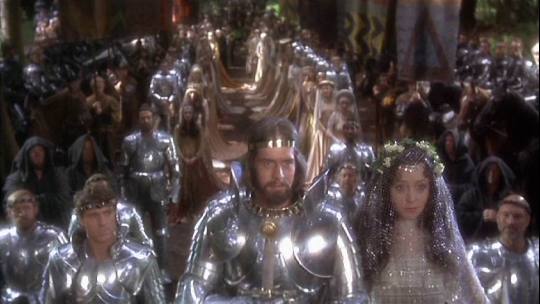
Excalibur is a cautionary tale. The characters are all struggling to find their place in the world, to maintain harmony with nature. Merlin says poignantly of Excalibur to Arthur, “It was forged when the world was young, and bird and beast and flower were one with man, and death was but a dream.” The film is a longing for a golden age, and the struggle to balance the warring natures of honour and goodness with human greed and jealousy. Surely the most rousing image is when Percival has returned the Grail to Arthur who, rejuvenated, also recovers Excalibur from Guinevere (now a nun, to atone for her adultery with Lancelot). She has kept it safe, knowing her once and future king would one day seek its power. Merlin is unfrozen by Arthur, and even Lancelot, a raggedy wild man driven into exile by his own shame, heeds his true king’s call. Arthur rides out with his knights and these fellow warriors through a re-blossoming countryside to do battle with Mordred for the soul of the land, to Carl Orff’s stirring music.
The name of Orff’s piece has Latin roots. 'Carmina' means 'songs', while 'Burana' is the Latinised form of Beuren, the name of the Benedictine monastery of Benediktbeuren in Bavaria. So, Carmina Burana translates as Songs Of Beuren, and refers to a collection of early 13th-century songs and poems that was discovered in Beuren in 1803 - although it has since been established that the collection originated from Seckau Abbey, Austria - and is now housed in the Bavarian State Library. The songs (over 1000 of them) were written in a mix of Latin, German and medieval French by the Goliards, a band of poet-musicians comprising scholars and clerical students, who celebrated with earthy humour the joys of the tavern, nature, love and lust. Although Orff set the original texts, he chose not to use the primitive musical notation that accompanied some of the songs. The collection was first published in Germany in 1847, but it wasn’t until 1934 that Orff came across the texts; a selection had been translated into English and formed part of a publication called Wine, Women And Song. With the help of Michael Hofmann, a law student and Latin scholar, Orff chose 24 songs and set them to music in what he termed a “scenic cantata”.
It was in this form that it was first heard on June 8, 1937, in Frankfurt, under its full title Carmina Burana: Cantiones Profanae Cantoribus Et Choris Cantandae Comitantibus Instrumentis Atque Imaginibus Magicis (Songs Of Beuren: Secular Songs For Singers And Choruses To Be Sung Together With Instruments And Magic Images) Quite a mouthful! After the triumphant premiere of Carmina Burana, Orff, then 41, wrote to his publishers: “Everything I have written to date, and which you have, unfortunately, published, can be destroyed. With Carmina Burana my collected works begin.” However, nothing Orff subsequently wrote ever came close to approaching the popularity of Carmina Burana. Oh dear.
youtube
Richard Wagner’s Siegfried’s Funeral March (from the opera Götterdämmerung) from: Excalibur (1981)
The film almost plays like a screen Opera - it is a heightened reality, a world anew. One where sex, jealousy and pride threaten to undo the mystical balance and ties between the King and the land. A powerful aid to that feeling is the superb score which utilises music such as Siegfried’s Funeral March by Wagner, and O Fortuna, a medieval poem set to music by Carl Orff. Boorman was determined to squeeze as much of the legend into his film’s running time as possible, chopping and condensing characters, and switching acts around. He created a three-act saga - the dark ages and the birth of Arthur, a period of brutality and superstition; the rise of Camelot and its age of reason, law, and dawning of Christianity; and the final descent into chaos and wasteland, where a frail Arthur commands the Round Table knights to seek out the Grail. Arising out of this a final battle commences for the soul of the land and the people, a sense of renewal with a promise of a new age to come. Boorman called it the “past, present and future of humanity.”
Richard Wagner composed his opera Götterdämmerung between 1869 and 1874. It is the last of the four operas that make up Wagner’s Der Ring des Nibelungen cycle, a project that had taken him over 25 years to complete. The opera is much renowned for its orchestral sequences, and these are often performed as concert extracts. Siegfried's Funeral March is taken from Act Three after Siegfried has been murdered by Hagen. Following his murder at the hands of Hagen, the death knell of “Siegfried’s Funeral March” opens with funereal timpani as Siegfried’s body is placed on his shield and carried off by the vassals. The music vacillates from deep mourning and rage-filled outbursts to the majesty of the “Hero” motif, brought out in bold relief at the centre of the movement.The whole opera is made up of musical motives from previous operas that tell of Siegfried's background, including the Volsung theme, Siegmund and Sieglinde's theme, the Sword, Brünnhilde's love theme and the curse of the Ring.
youtube
Richard Wagner’s Ride of the Valkyries (Die Walküre) from: Apocalypse Now (1979)
Francis Ford Coppola's Vietnam War phantasmagoria is an epic fresco oozing with madness. It is a madness that manages to escape from the frame and infect the director and his team, turning the film into a legend. It is impossible not to talk about this film without mentioning the Dantesque shooting of the film. A typhoon that destroyed the sets, a heart attack that nearly killed Martin Sheen, a Brando who was more obese and obtuse than ever, who arrived on the set without knowing his lines, and a director at the end of his rope physically and psychologically, on the verge of divorce and suicide. Instead of taking four months to complete, the shoot lasted 15 months. The analogy with the hell of Vietnam is obvious.
The film itself is about Benjamin Willard, a special forces captain, who is given a highly perilous mission: to find and assassinate Colonel Kurtz, a renegade who has set up his headquarters on the Cambodian border. To accomplish his mission, Willard must travel up a river in a small patrol boat with a handful of men. We follow Willard sinking into the madness and insanity of this war, personified by the character of Colonel Kurtz, an obese Buddhist, a true godfather of the Vietnamese jungle. Apocalypse Now is in fact a mirror for the spectator, it plays on our feelings about the Vietnamese conflict, and this is what sets it apart from other great war films. It is a physical and very real journey through Vietnam, but also an inner journey for its hero, Willard, a drug addict and alcoholic, which will allow Coppola to make his denunciation of the war. After watching this movie over several years I’ve come to regard Coppola’s movie as more than just a war movie but also an hallucinatory trip, as anxiety provoking as possible, about the human soul lost inside itself.
For a movie that had two of my greatest loves - combat helicopters and Wagner - the film surprisingly didn’t inform my future career path as a combat pilot for the British Army. I was too young as a teen and caught up with other feminine things girls of my age did. But watching it retrospectively I’m sure it had some unconscious influence on me. I noticed things more with each viewing such as before Jim Morrison's paradoxical and delightful prologue, it is the helicopter blades that open Apocalypse Now. The jerky noise that spatialises this mortifying horizon is a motif that will be the melodic line of the entire film. In crosshatching, it truncates reality and allows the initial confusion of a man in reverse who opens his eyes on an uncertain world. The fan in the hotel room is not the air-conditioned shelter of war. Everything, from then on, is under the sign of duality.

Then of course we have the euphoric scene but no less horrifying than the helicopter attack by Kilgore and his men to lay waste to a village so that they could surf. And all done to the terrifying bombast of Wagner’s Ride of Valkyries. It’s a demented scene but also so visually lyrical. Wagner’s Ride of the Valkyries is sadistically perfect. It’s a perfect mythical metaphor of the valkyries who majestically flew in the sky and decided who died in battle from above. Of course the symbolism of Wagner - wrongly tarred with its fascist connotations - as a place holder for Western imperialism over the Vietnamese is not lost on the viewer. It’s a clever piece of juxtaposition.
Armies have of course used music in warfare for millennia. The deployment of musicians - from trumpeters to drummers - in battle was useful in instilling regimentation and rhythmic purpose for soldiers; and in days before radio, in carrying specific orders across the battlefield. As well as unifying an army - it could potentially disorient the enemy, or as Kilgore eruditely elaborates: ‘We use Wagner, it puts the shits up the slopes. My boys love it!’. So what we are seeing is an age old military tactic being given a modern twist. This has already been established by the notion of an air cavalry, trading their horses for helicopters - which gets further embodied by Kilgore’s wearing of a cowboy hat, common to the Western film genre. The symbolism of linking old and new - ancient and modern, history and the present - occurs throughout Apocalypse Now, as it does in the original novella Heart of Darkness. It indicates an uncomfortable continuum, a never ending foreboding cycle. That beneath the fragile veneer of civilisation, humanity is endlessly repeating barbarism - a cycle foreshadowed by helicopter/fan blades at the start of the film which also loops back to become the end of the film - itself a cycle that won’t end.
When I flew combat helicopters over in Afghanistan we were banned from playing music in our cockpit. It’s simply not practical because you need to be aware of all your aural cues of what the hell is going on around you as every mission is task intensive. You’re focused on a mission where the shit can hit the fan such as coming under rocket attack at any second especially if you’re on a night mission. In theory you could, as anyone with some audio equipment and electronics knowledge could wire in a 3.5mm headphone jack and hook up your music into your own helmet. I knew some pilots who broke the ban and did this. They would get their clever avionic ground staff technician crew to put in a some sort of patch cord that could plug through to their helmet ICS - in return you get them a case of beer. I’m not telling where we got the beer from.
Other honourable mentions:
Second movement of Schumann's Piano Quintet from: Fanny and Alexander (1982)
Gaetano Donizetti’s Lucia di Lammermoor "Il dolce suono" from: The 5th Element (1997)
Rodrigo's Concierto de Aranjuez from: Brassed Off (1996)
Maurice Ravel’s Trio en la mineur pour piano, violon et violoncelle, Sonata for Violin and Cello, Violin Sonata #2 in G, and Berceuse Sur le Nom De Gabriel Fauré from: Un Coeur en Hiver/A Heart in Winter (1992)
Mozart’s Divertimento in D major, K. 136 from: Out of Africa (1985)
Carl Orff - Schulwerk Volume 1: Musica Poëtica - Gassenhauer from Badlands (1973)
Puccini’s O mio babbino caro (aria from the opera Gianni Schicchi) from: A Room with a View (1985)
Verdi’s La forza del destino (the Force of Destiny) overture from: Jean de Florette (1986)
Mozart’s Letter Duet (from The Marriage of Figaro) from : The Shawshank Redemption (1994)
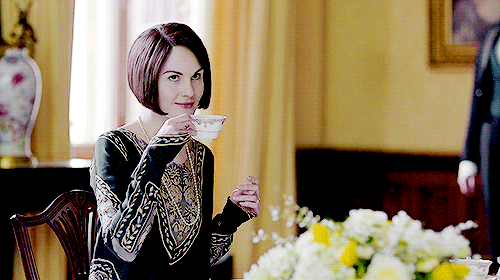
Thanks for your question
#ask#question#music#film#soundtrack#movie#cinema#film soundtrack#composer#classical music#arts#culture#personal
63 notes
·
View notes
Text


"All the Secrets and No One to Tell." A soundtrack-mix for Jim Prideaux of Tinker Tailor Soldier Spy.
Listen (YT)
Lyrics/excerpts:
“They were at Oxford together before the war.” “And stablemates in the Circus during and after. The famous Haydon-Prideaux partnership.” 1. Charade - Matt Monro Oh what a hit we made We came on next to closing Best on the bill, lovers until Love left the masquerade
Fate seemed to pull the strings I turned and you were gone While from the darkened wings That music box played on
“'Drop out,’ he said. ‘You’re a lucky man, Jim,’ he kept saying. ‘You’ve been ordered to become a lotus-eater.’ I could forget it. Right? Forget it. Just behave as if it had never happened.” He was shouting. “And that’s what I’ve been doing: obeying orders and forgetting!” 2. Eminence Front – The Who That big wheel spins, the hair thins People forget Forget they're hiding The news slows People forget Their shares crash, hopes are dashed People forget Forget they're hiding
Sometimes he thought of the wound as a memory he couldn’t keep down. He tried his damnedest to patch it over and forget but even his damnedest wasn’t always enough. 3. The Story of a Hero – Dmitri Kabalevsky
He also imagined that, like himself, Jim had had a great attachment that had failed him, and which he longed to replace. But here Bill Roach’s speculation met a dead end: he had no idea how adults loved each other. 4. Loneliness – Sergei Rachmaninov
And hearing Tom Tower strike the evening six he found himself thinking of Bill Haydon and Jim Prideaux, who must have arrived here the year that Smiley went down and were gathered up by the war; and he wondered idly how they must have looked together then, Bill the painter, polemicist, and socialite; Jim the athlete, hanging on his words. In their heyday together in the Circus, he reflected, that distinction had all but evened out… Only at the end, the old polarity asserted itself… 5. High Hopes – Pink Floyd Encumbered forever by desire and ambition There's a hunger still unsatisfied Our weary eyes still stray to the horizon Though down this road we've been so many times
The grass was greener The light was brighter The taste was sweeter The nights of wonder With friends surrounded
“And did you take to it, Jim, to Control’s theory? How did the idea strike you, overall?” “Damn silly. Poppycock.” “Why?” “Just damn silly,” he repeated in a tone of military stubbornness. “Think of any one of you – mole – mad!”
6. Love Is Blindness – Morten Schantz Trio
Not for the first time, Smiley had the distinct sense of stumbling not on Jim’s ignorance but on the relic of a willed determination not to remember. In the dark, Jim Prideaux’s breathing became suddenly deep and greedy. He had lifted his hands to the top of the wheel and was resting his chin on them, peering blankly at the frosted windscreen.
7. Found Song For P. – Max Richter
When finally the big session started – the one he remembered as the marathon – he had the disadvantage of feeling half defeated when he went in. “Matter of health, much as anything,” he explained, very tense now. “We could take a break if you want,” said Smiley, but where Jim was there were no breaks, and what he wanted was irrelevant.
8. Novelette – Dmitri Kabalevsky
“And no word from Bill?” he went on. “Not even a postcard.” “Bill was abroad,” said Jim shortly.
9. Why – Pyotr Tchaikovsky Why is the sun cold and dull in the sky, as if it were winter? Why – tell me quickly – did you forget me?
Only once, when Guillam forgot Smiley and out of instinct turned upon his own tracks, did he have a suspicion of a third figure walking with them: a fanged shadow thrown against the broadloom brickwork of an empty street, but when he started forward it was gone.
10. Circles from the Rue Simon-Crubellier – Max Richter
Then for a moment, one part of Smiley broke into open revolt against the other. The wave of angry doubt that had swept over him in Lacon’s garden, and that ever since had pulled against his progress like a worrying tide, drove him now onto the rocks of despair, and then to mutiny: I refuse.
11. Brain Damage / Eclipse – Pink Floyd And all that you love, and all that you hate All you distrust, all you save And all that you give and all that you deal And all that you buy, beg, borrow, or steal And all you create, and all you destroy
And all that is now, and all that is gone And all that's to come And everything under the sun is in tune But the sun is eclipsed by the moon
“Well, damn it, I got him back,” Haydon snapped. “Yes, that was good of you. Tell me, did Jim come to see you before he left on that Testify mission?” “Yes, he did, as a matter of fact.” …He came to warn you, Smiley thought; because he loved you… Jim was watching your back for you right till the end.
12. Comrades – Clint Mansell
Smiley shrugged it all aside, distrustful as ever of the standard shapes of human motive, and settled instead for a picture of one of those wooden Russian dolls that open up, revealing one person inside the other, and another inside him. Of all men living, only Karla had seen the last little doll inside Bill Haydon.
13. Exile - Killing Joke Outside the boundaries where all the streets are empty In such a lonely moment we reach the same conclusion Chants of cathedral choirs, stations of iron cogs grind Primeval screams we heard, release cannot be found
We that have tasted such beauties of corruption Triumphal arches raised designed to fall again My kingdom and place of exile
…in the open night under a clear sky, lit by several hand torches and stared at by several white-faced inmates of the Nursery, sat Bill Haydon on a garden bench facing the moonlit cricket field. He was wearing striped pyjamas under his overcoat; they looked more like prison clothes. His eyes were open and his head was propped unnaturally to one side, like the head of a bird when its neck has been expertly broken.
14. Like Two Strangers – Trentemøller
For the rest of that term, Jim Prideaux behaved in the eyes of Bill Roach much as his mother had behaved when his father went away… Worst of all was his staring, empty look when Roach caught him unawares, and the way he forgot things in class, even the red marks for merit: Roach had to remind him to hand them in each week.
15. Love Is Blindness – U2 Love is clockworks, and cold steel Fingers too numb to feel Squeeze the handle, blow out the candle Love is blindness, I don’t want to see Won’t you wrap the night around me?
Love is drowning in a deep well All the secrets and no one to tell
With time, Jim seemed to respond to treatment, however. His eye grew clearer and he became alert again, as the shadow of his mother’s death withdrew. By the end of the play, he was more light-hearted than Roach had ever known him.
16. Time – Hans Zimmer
“But Jim acts from instinct… he is functional… He’s my other half; between us we’d make one marvellous man, except that neither of us can sing.”
17. You Always Hurt the One You Love – Connie Francis You always hurt the one you love The one you shouldn't hurt at all You always take the sweetest rose And crush it till the petals fall
You always break the kindest heart With a hasty word you can't recall So if I broke your heart last night It's because I love you most of all
started and fin. 2012.
12 notes
·
View notes
Text
I remember there was speculation on YouTube that Marckus would end up Embraced, and whilst Pyotr is dead and Kevin seems to no longer be a threat, I think it's worth noting that the Tzimisce exist, their thing is body horror and unethical scholarship, and their symbol looks like This:

Hmmmmm.
#htp#fan theory#i don't *want* it but i can *see* it#if nothing else maybe we'll see tts!ahriman again#hunter the parenting#hunter: the parenting
34 notes
·
View notes
Text
Tatiana
FC: Felicity Jones
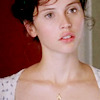
NAME: Tatiana Nikolaevna Romanova
TITLES: Grand Duchess
NICKNAMES: Tatya, Tanushka, Tanya
AGE: verse dependent, born 1897, was 21 when she was murdered
PERSONALITY: Out of the five siblings, Tatiana was the most orderly and practical. She would often correct her siblings and remind them about behaving when they were rowdy. As she grew older, she took on most of the responsibility of the household, despite being 18 months younger than Olga, and was always aware of her station as daughter of the tsar. She wanted to work hard and be useful, but like her siblings had a kind heart on her sleeve, even though she had the tendency to be cut off from others.
ABOUT: The second born daughter of Tsar Nicholas II, Tatiana was born June 10th, 1897. While her parents were happy she was healthy, it still meant her father had no heir. However, Nicholas was the one who named her and her sister after Alexander Pushkin’s novel Eugene Onegin, as he liked the idea of having daughters named after the sisters from the story.
Tatiana was the more sensible of Nicholas and Alexandra’s children and was quite religious and read from her Bible often, as she saw it was her duty. She was the most like their mother, and was the only one out of five children who seemed to understand her, and in so, ended up with the nickname ‘Governess’. However, it was Tatiana that was always sent to their parents whenever the children wanted something, as she was quite skilled in taking charge of situations and negotiating.
Growing up, she seemed to be less open and spontaneous than her sister Olga, and was even less talented in most things, but she worked harder and with more determination. She especially liked embroidery and stitch work. As a teenager, she was assigned a regiment of soldiers, the Vosnesensky Lancers, and was given the honorary title of Colonel. Tatiana loved going out to inspect and greet the soldier, and even found herself becoming infatuated with some. However, she found their behavior to be a bit shocking, even when they were in her presence.
After the assassination of Pyotr Stolypin at the Kiev Opera House, Tatiana had trouble sleeping afterwards. She became a nurse, with Olga and their mother at the outbreak of the Great War. Most considered her to be an excellent nurse and to be very skillful, so much so that a war aid committee was named after her. The burdens of war soon fell on her shoulders and she even felt guilty that she couldn’t do anything to help, so she began to make more public appearances, even more than Olga. Several soldiers passed through the hospital and she became infatuated with them. One in particular was Dmitri Yakovlevich Malama. He even gave her a dog at one point, but nothing serious came out of it unfortunately. Like Olga, matches for Tatiana were often speculated. At one point, the potential marriage between her and Alexander I of Serbia was even considered before the war.
Once the family was under arrest, Tatiana found it hard as she felt out of place from not having anything to do. She missed the hospital and being a nurse. It was noted that she had even lost a lot of weight. The situation weighed heavy on her mind, but that didn’t keep her from speaking to the soldiers that were there to guard them at Ipatiev. She even kept an optimistic future about going to England. Just like when they were younger, Tatiana was the one sent to the soldiers or Yurovsky to negotiate for things. Otherwise, she was found reading her Bible or speaking with her mother until that final night. She had even asked Yurovsky that evening if they could bring back the little kitchen boy that Alexei liked to play with, but that wouldn’t happen.
After the reading of the execution sentence and all hell broke loose, Tatiana had tried to stand to get to her father, but she had been shot in the head.
2 notes
·
View notes
Text
Killing Eve: A Theory of Family Ties
How complex are these web of lies? That's what the show is basically a huge spider web, everyone is connected by secrets and lies but by what placements? This is a complex question in of itself, which will be answered later in the season(s). But we'll theorize on one small portion, family ties.
Villanelle may have been born into the arms of the 12,her entire life could have been in their shadow. This is not a new theory, but it's still a juicy one to consider as Dasha claims at knowing Villanelle since she was a prepubescent. Villanelle's father Anatoliy Astankov was probably apart of the 12, albeit not high up (many speculated he was or is high up but I disagree), most likely low level (as in a runner, regular crook, handler...assassin? well that's a stretch), and most likely knew Konstantin. There is a possibility that Villanelle's father saw potential in Villanelle to be an assassin or he was told she had potential. That meant being very involved in her upbringing, something Tatianna, Villanelle's mother did not like; not because she cared for her daughters future. She hated Villanelle, she felt her husband loved their daughter more than he loved her. We don't know for sure what happened to Anatoliy, Tatianna and Villanelle blame each other. Most likely got killed by the 12's assassin's, and went 'missing' or Tatianna did kill him, who knows fact is once Anatoliy was gone Tatianna dumped Villanelle.
I do believe Konstantin knew Tatianna intimately, as in had an affair with his friend/co-workers wife. I don't believe Konstantin to be Villanelle's father but Pyotr's father. One thing to consider is Carolyn's children, Geraldine being the oldest and the biological child of her husband and Kenny being the product of an affair and the child of Konstantin. Reflects Villanelle being the biological child of Anatoliy and Pyotr being the child of Konstantin and Tatianna's adultery. I'm not the only one who thought Pyotr was Kenny in a blonde wig and beard...
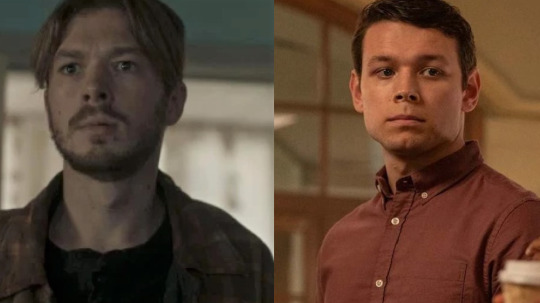
It does make sense, as Konstantin did 'see a photo' of Villanelle as a baby, more like he saw her with his on eyes as in he knew her family and he looked real guarded when Villanelle asked how he knew what she looked like as a baby. Also knew Tatianna was 'insane' and an unfit mother. I know this might be a lot and many have guessed that the 12 didn't know about Oksana - we don't know that, it's possible they lost track of her, child welfare lose track of a bunch of kids in the US i'm sure it's the same in Russia. The 12 most likely have a whole file of potential assassins and are monitoring from afar these children to see if they can be killers, you can't have a subject too impulsive or too hesitant.
What's the best way to train a killer? You can train them to shot and fight and manipulate, but will they be able to kill efficiently, I mean look at Nadia and Diago they were horrible. To kill, it's all psychological, trauma that life provides is the best teacher. It's a plus when a subject already has a violent instinct.
Maybe that's why Konstantin was frightened when Irina killed, he thought about what happened when Anatoliy encouraged Villanelle's violent urges and didn't want that for his daughter. To add maybe that's why Konstantin loves Villanelle so much is because she reminds him of his old friend Anatoliy, plus she has the beauty of her mother to top it all off.
Yes, another layered theory from my obsessive brain, cool beans. Also if Konstantin is revealed to actually be Villanelle's father I will flip my shit. Want more of my bullshit, go here.
28 notes
·
View notes
Photo
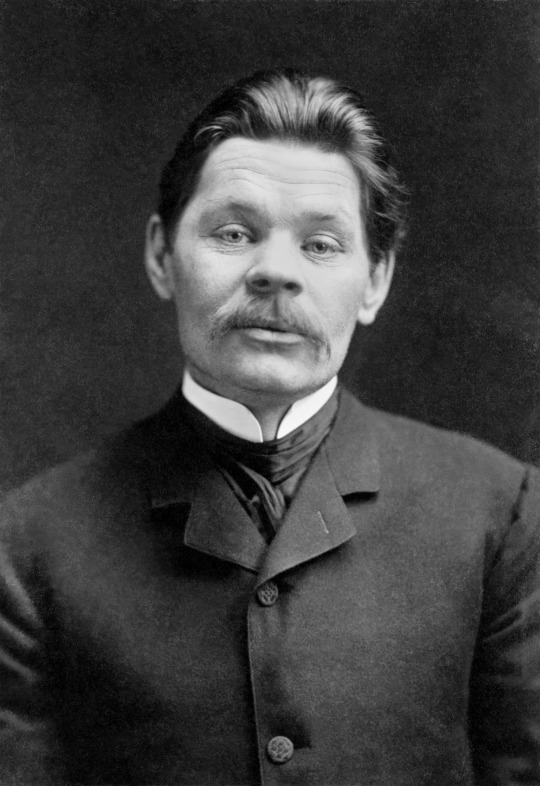
Alexei Maximovich Peshkov, primarily known as Maxim Gorky, was born March 28 1868. He was a Russian and Soviet writer, a founder of the socialist realism literary method, and a political activist. He was also a five-time nominee for the Nobel Prize in Literature. Prior to his renown as an author, he frequently changed jobs and roamed across the Russian Empire; these experiences would later influence his writing. Gorky's most famous works were The Lower Depths (1902), Twenty-six Men and a Girl (1899), The Song of the Stormy Petrel (1901), My Childhood (1913–1914), Mother (1906), Summerfolk (1904) and Children of the Sun (1905). He had associations with fellow Russian writers Leo Tolstoy and Anton Chekhov; Gorky would later mention them in his memoirs.
Gorky was active in the emerging Marxist communist movement. He publicly opposed the Tsarist regime, and for a time closely associated himself with Vladimir Lenin and Alexander Bogdanov's Bolshevik wing of the party. For a significant part of his life, he was exiled from Russia and later the Soviet Union. In 1932, he returned to the USSR on Joseph Stalin's personal invitation and lived there until his death in June 1936.
With the increase of Stalinist repression and especially after the assassination of Sergei Kirov in December 1934, Gorky was placed under unannounced house arrest in his house near Moscow in Gorki-10 (the name of the place is a completely different word in Russian unrelated to his surname). His long-serving secretary Pyotr Kryuchkov had been recruited by Yagoda as a paid informer. Before his death from a lingering illness in June 1936, he was visited at home by Stalin, Yagoda, and other leading communists, and by Moura Budberg, who had chosen not to return to the USSR with him but was permitted to stay for his funeral.
The sudden death of Gorky's son Maxim Peshkov in May 1934 was followed by the death of Maxim Gorky himself in June 1936 from pneumonia. Speculation has long surrounded the circumstances of his death. Stalin and Molotov were among those who carried Gorky's urn during the funeral. During the Bukharin trial in 1938 (one of the three Moscow Trials), one of the charges was that Gorky was killed by Yagoda's NKVD agents.
In Soviet times, before and after his death, the complexities in Gorky's life and outlook were reduced to an iconic image (echoed in heroic pictures and statues dotting the countryside): Gorky as a great Soviet writer who emerged from the common people, a loyal friend of the Bolsheviks, and the founder of the increasingly canonical "socialist realism".
Daily inspiration. Discover more photos at http://justforbooks.tumblr.com
17 notes
·
View notes
Text
Killing Eve: Episode Analysis
*SPOILERS*
Season 3, Episode 4 - Still Got It

This episode is different to all the other episodes of this season, as well as the whole series, as it is not structured chronologically, but it’s order goes through each character’s separate timeline instead.
We begin with Niko who is starting his new life in Poland, as a bread delivery man. Just like Villanelle does, it’s apparent that Niko also has a type, as when he’s in a bar he looks interestedly at a woman with the same voluminous, curly hair that Eve has.

When we get to Eve’s storyline, we see her in the Bitter Pill office. She’s getting ready for work after spending the night there, after Villanelle broke into her apartment and left the pink teddy bear with the voice recording in it.
When Eve is brushing her teeth, the camera specifically pans onto her toiletry bag as she puts her toothbrush back in it. Our attention is being drawn to this, in connection to S2E6. In S2E6 when Villanelle broke into Eve’s house to mess with her things, she brushed her teeth with Eve’s toothbrush and puts the toothbrush back into the same toiletry bag that we see Eve using in this scene; so we can see that Eve is still using the same toothbrush from that episode - Villanelle still manages to pop-up unexpectedly in Eve’s life, even though she is trying to forget about her.
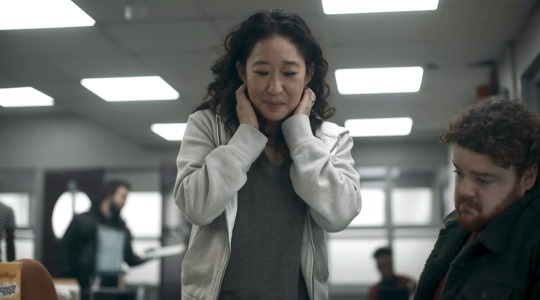
When the bus birthday cake from Villanelle arrives at the Bitter Pill office, Eve knows it’s from Villanelle and she touches her neck. She touches her neck in exactly the same way as this in S2E5, when the white roses spelling Eve’s name arrives on her doorstep. Eve repeating the same action, immediately after receiving another gift from Villanelle, shows us how just like in S2E5, Eve is feeling flattered by the attention and knowing that Villanelle is thinking about and paying attention to her.
A song starts playing over this scene of Eve receiving the cake, which doesn’t look like it’s been released yet, but we can assume it’s by Unloved. The lyrics that can be heard are:
“I once had a love,
Or did Love have me?
It set me free,
It set me free”
The lyrics represent Eve’s inner turmoil in regard to her feelings for Villanelle. She can’t decide if Villanelle was once her “Love” or if Villanelle “had” her (if she only belonged to Villanelle) - she can’t decide if the feelings she had/has are her own, and what she really wants, or if she is powerless to Love’s control over her.
This struggle to determine her love and her feeling’s over Villanelle is what causes Eve to have the same reaction to the bus cake that she had with the teddy bear recording. With the recording she is angry with it at first, but then she changes her mind and holds it up to her ear to repeatedly listen to Villanelle’s voice. Similarly to the recording she feels both happy and angry when she receives the cake. She first puts her hands to her neck (which shows us she’s flattered), then proceeds to throw the cake off the building in anger, but then almost immediately after she’s let go of the cake she yelps in distress, suddenly regretting what she’s done.
Another interesting thing to note is that no-one else acknowledges or is even aware that it’s Eve’s birthday, except for Villanelle. It’s highlighting how Eve is isolated in her life and now has no-one left who knows her so well or cares about her as much, except for Villanelle.
Regarding the story that Konstantin gives in S3E8, about what happened with him and Kenny, we can see that the story doesn’t add up. The wall around the roof of the building, which Eve throws the cake from and which Kenny supposedly “got scared” and accident fell off, is way to high for this to have happened.
[Unrelated but in the same vein, is that in this scene we can see that there are two chairs on the rooftop, one of which Eve put the cake on and the other has been knocked over. We know from Bear’s video footage from S3E8, that Kenny and Konstantin seemed to be alone before Kenny died. So it looks like perhaps the two of them were sat talking on the roof (Konstantin might have been interrogation Kenny about what he knew) and then maybe Konstantin pulled Kenny off his chair and was holding him at the wall around the rooftop to threaten him and then that’s possibly when he accidentally fell off - just a speculation.]
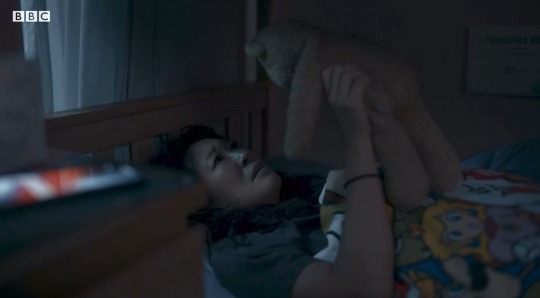
After Jamie told Eve to stay at his house, we see Eve lying in bed holding up one of Jamie’s child’s teddy bears. She holds the bear up above her face and asks it “what do you want from me?”. Eve is clearly speaking to the bear in lieu of Villanelle, she is recreating their encounter on the bus when Villanelle was face to face with her.
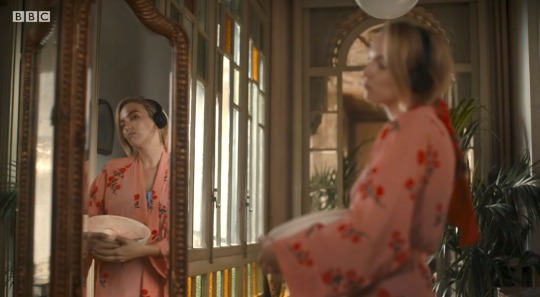
When we get to Villanelle’s portion of the episode, we see her dancing in her Barcelona apartment while she’s trying to make a birthday cake for Eve. Dancing is a big theme in Season 3. We only see Villanelle dancing comfortably twice, once in this scene and the second time is in the tea dance scene from S3E8. In the dancing in this episode, Villanelle is on her own but she’s thinking about Eve and the encounter they just had on the bus. In the tea dance scene Villanelle is also dancing with Eve.
In this Season they use dancing as a symbol of happiness and comfort, and more specifically having these things with other people or another person - dancing is a two person activity, an intimate activity and also something that people aren’t willing to do if they don’t feel completely comfortable.
The previous times Villanelle tried to dance, was at her wedding with Maria in S3E1 and with her family in S3E5, people who you ordinarily should be able to feel comfortable with. So Villanelle only being able to dance when she’s either thinking about or is physically with Eve, shows how she’s never as truly comfortable or vulnerable as when she’s with Eve - also stressing the point that they’re soulmates, which is another theme in Season 3.
This is also the first time that we see Villanelle listening to music through headphones, and she continues to do this in the next episode, S3E5. As she starts to listen to music after her kiss with Eve on the bus, and when she’s making Eve’s birthday cake, we can see that it’s from Eve and the rejuvenation of their relationship that she starts to do this.

Although Villanelle has found out from Dasha that she is being given her promotion, while she is out shopping she still pauses to look longingly at two women shopping together. Even though she has everything she was always aiming to get (money, status, a nice flat, a fun job) and is going up in the world in her professional career, she still can’t help but feel that there’s something missing in her life, she still doesn’t have that “someone to watch movies with” that she told Eve she wanted in S1E8.
As Villanelle is out shopping, the song ‘Satan Is His Name’ by Holly Golightly starts to play. The lyrics are:
“Satan is a name he goes by,
He got a lotta devil in his eye,
He got a kiss of fire and it burns you well,
Breaks your heart and it hurts like”
The first two lines of the lyrics that are heard, are played when Villanelle is walking along with her shopping, giving us the impression that Villanelle is “Satan”. However, the next two lines are played as Villanelle is observing the two women in the shop; telling us that “Satan” is actually Eve, because Eve is the one who hurt and broke her heart. This makes sense as Villanelle is thinking about Eve kissing her on the bus and probably how, although it seems like Eve finally reciprocated her feelings, they haven’t spoken about it and so it hasn’t been made clear if this is the case - and so she could still be burned and hurt by Eve.
The fact that we are initially led to believe that “Satan is Villanelle, but the it turns out to be Eve, also emphasises how they’re now becoming “the same” more than they were before - they are both “Satan” because they both have the same “darkness” and “monster” within them.
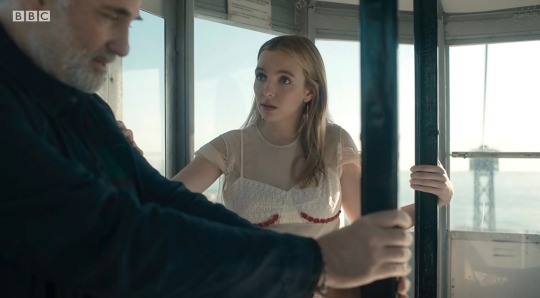
In return for finding the information about her family that Villanelle asked for, Konstantin says to her, “but I need you to do something for me, something personal, off the record”. Just like in S1E1, when Villanelle repeats Konstantin saying that he can’t stay and watch a movie; and in S1E8, when she repeats what Irina says about languages - Villanelle being able to repeat these things shows us that Konstantin has repeatedly asked Villanelle to do ‘off the record’ jobs for him throughout the years, as a favour.
After Konstantin has given Villanelle the information about her family, she starts to hiccup, which continues throughout the episode. One reason for Villanelle’s hiccups could be because she was in shock, after slapping Eve in S2E8 she tells her “you were in shock. You needed a surprise, like hiccups”. So similarly, Villanelle could have been in shock from finding out her family was actually alive after thinking for her whole life that they died in a car crash.
However Villanelle’s hiccups do have a clear link to her association with family, as she first gets them when she’s with Konstantin and learns her family are alive, and also when she’s experiencing what it’s like to be a child when she’s playing and is hugged in the garden with Kruger’s wife. Villanelle also explicitly says to Pyotr in S3E5 that she came home “because I had the hiccups”.
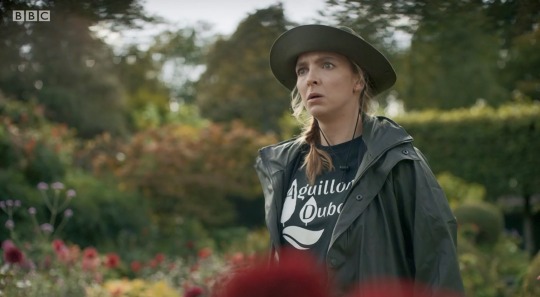
We then see that the “off the records” job that Konstantin has asked Villanelle to carry out, is killing Bertha (Kruger’s wife) to tie up his loose ends from the money he stole from The Twelve.
Since we know that freedom is very important to Villanelle, she tells Bertha that she should be happy, saying to her “you’re free now, you can be whoever you want”; but Bertha replies by saying “I don’t want to be free, I want to be a family”. By giving Konstantin’s betting slip, and their chance of “freedom” to Eve in S3E8, it shows just how much trust Villanelle has in Eve; to be able to entrust her with the key to the thing she regards as the most important - Eve isn’t just an obsession (like Anna) for Villanelle anymore, but she’s become the only person who she knows that she can truly rely on.
Interestingly though, Villanelle does say to Bertha that it’s her husband’s death which enables her to be “free now” and she “can be whoever you want”. This brings to surface the thought that maybe Villanelle considers that freedom for herself, and being allowed to be whoever she wants, is similarly only attainable by being without Eve. Villanelle does tell Konstantin in S3E6 that she’s willing to leave with him and she’s aware that means leaving Eve behind as well. However, she seems to change her mind by S3E8 and chooses her family (Eve) over her freedom (leaving with Konstantin). Although Villanelle doesn’t understand it at the time, Bertha’s statement to Villanelle, “I don’t want to be free, I want to be a family”, becomes true for her by the end of the season.
At this point, Villanelle also still can’t understand the love that Bertha has for her husband and family, in favour of her own freedom; in the same way as she couldn’t understand why the prison mate in S1E7 would “rather die” than have her freedom; and just as the nanny from S3E3 was so willing to sacrifice her own life for a baby that wasn’t even her’s.
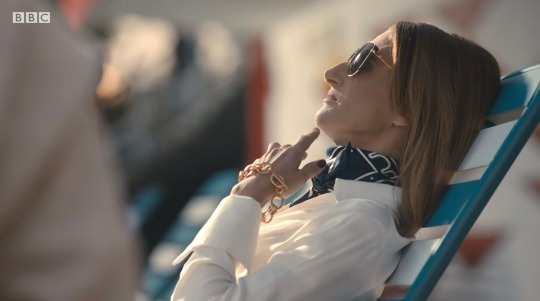
When Hélène goes to speak to Dasha at the swimming pool, she describes Eve as “the one who wears the...” and then Dasha finishes Hélène’s thought with “...turtleneck”. It is interesting that Eve’s turtlenecks are her defining and notable feature, as when Villanelle returns to Mother Russia, she too wears a turtleneck. If Hélène and Dasha have noticed that Eve wears turtlenecks, then Villanelle definitely has. Therefore Villanelle’s choice to wear a turtleneck, when she’s going to be reunited with her family, is like she’s taking a bit of comfort with her. She’s choosing to wear something that Eve is known for wearing so that she can feel close to Eve, and can have the comfort of her being with her when she’s going to do something that’s so important, nerve-wracking and uncertain for her.
Villanelle’s choice to wear a turtleneck is also her attempt at blending in. The turtleneck is something Eve is obviously known for wearing, and so because Eve wears them, Villanelle associates the turtleneck (like Eve) with all things normal and ordinary. However, despite her attempt, it’s clear from the rest of her outfit that she’s still far too well/over-dressed in comparison to the rest of Grizmet’s inhabitants.
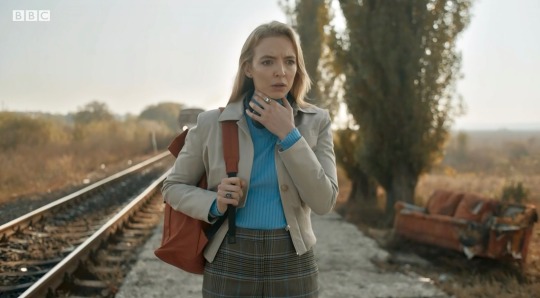
When Villanelle arrives at the train platform in Mother Russia at the end of the episode, she touches her neck. This scene comes right after Niko has just been stabbed in the throat by Dasha, and so it could be to demonstrate Villanelle’s connection with Eve - in line with the ‘soulmates’ theme of Season 3 - it could be to show that Villanelle is being stopped in her tracks by feeling Eve’s grief and shock at seeing Niko being stabbed (in a similar vein as when people say that they just felt a chill, like someone was walking over their grave).
However, Villanelle touching her neck could also be a sign that her hiccups have gone, as she doesn’t get them again after this moment. It could be that by returning home to Mother Russia, Villanelle got the “surprise” that she mentioned to Eve in S2E8 that you need to get rid of the hiccups. The ambiguity of the action of Villanelle touching her neck (given that we’ve seen that she’s had hiccups throughout the episode but also that this happens right after Niko is stabbed in the neck) indicates that she touches her neck for both of these reasons, not just one or the other.
You can read my previous Killing Eve posts here:-
First Introduction to Villanelle
First Introduction to Eve
S1, E1 - Nice Face
S1, E2 - I’ll Deal With Him Later
S1, E3 - Don’t I Know You?
S1, E4 - Sorry Baby
S1, E5 - I Have a Thing about Bathrooms
S1, E6 - Take Me to the Hole!
S1, E7 - I Don’t Want to Be Free
S1, E8 - God, I’m Tired
S2, E1 - Do You Know How to Dispose of a Body?
S2, E2 - Nice and Neat
S2, E3 - The Hungry Caterpillar
S2, E4 - Desperate Times
S2, E5 - Smell Ya Later
S2, E6 - I Hope You Like Missionary!
S2, E7 - Wide Awake
S2, E8 - You’re Mine
S3, E1 - Slowly Slowly Catchy Monkey
S3, E2 - Management Sucks
S3, E3 - Meetings Have Biscuits
S3, E5 - Are You From Pinner? [Part 1]
S3, E5 - Are You From Pinner? [Part 2]
S3, E6 - End of Game
S3, E7 - Beautiful Monster
S3, E8 - Are You Leading or Am I? [Part 1]
——————————————————————————
#killing eve#killing eve season 3#killing eve episode analysis#3x04#ke#villaneve#eve polastri#villanelle#killing eve analysis#killingeveedit#movies#film#cinematography#tv reviews#reviews#good tv#tv recommendations#killing eve spoilers#killing eve discussion#ke analysis#killing eve 3x04#killing eve S3E4#phoebe waller bridge#jodie comer#sandra oh#fiona shaw#scene breakdown#carolyn martens#lgbtq#killing eve still got it
54 notes
·
View notes
Note
evan peters plays a variety of roles from an assassin to an ordinary civilian who gets roped into this world of intrigue until season 7 when he inexplicably plays pyotr and the entire fandom speculates whether he had plastic surgery or hes secretly an incarnation of the devil until its revealed its both
CHRIST!!!!! I CANT BREATHE
2 notes
·
View notes